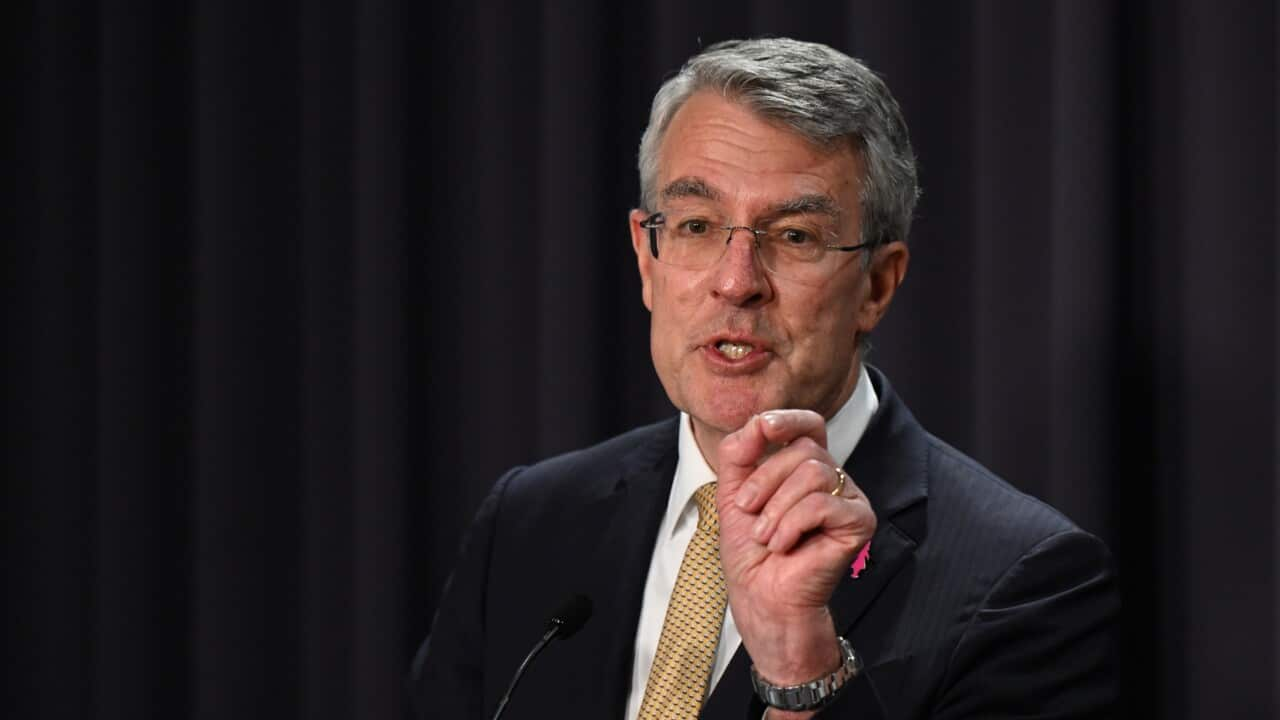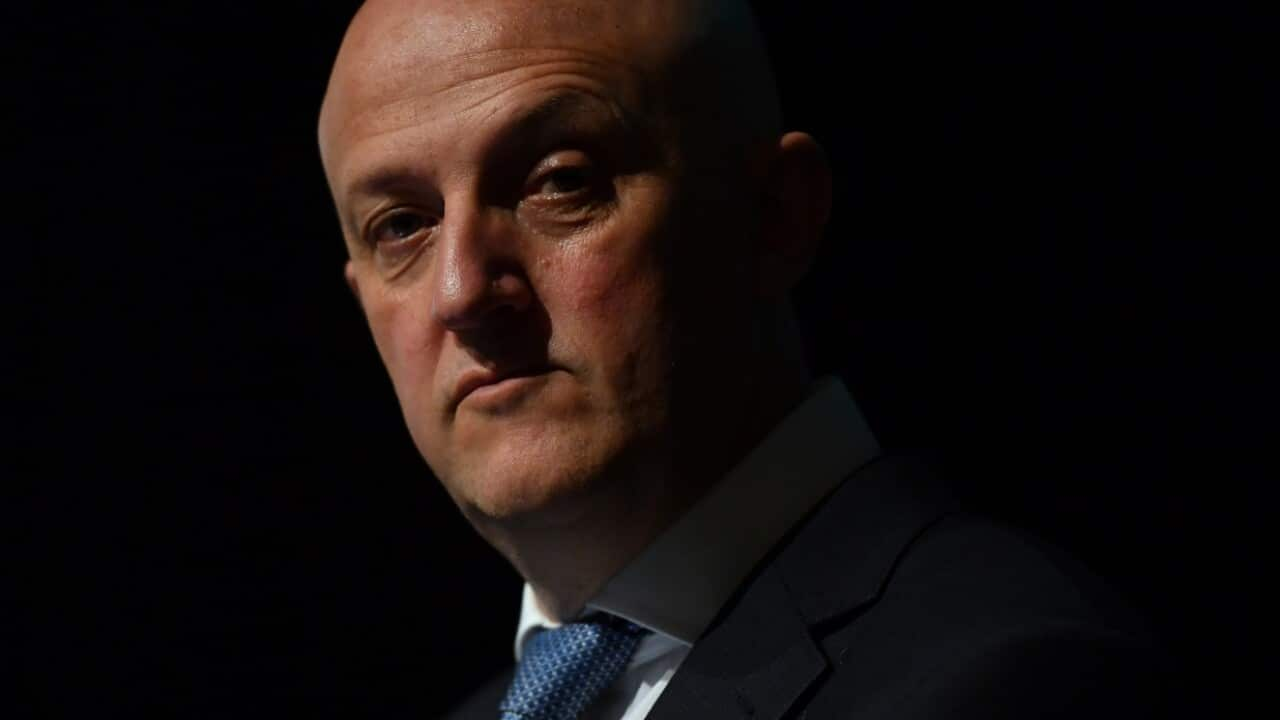KEY POINTS:
- Labor is seeking to pass its ban on hate symbols in public and online.
- The bill would include Nazi symbols and those used by proscribed terror groups.
- But peak Muslim groups warns it could have implications for regular expressions of faith.
Islamic groups fear Labor's hate symbols ban could mean Muslims are over-policed for expressing their faith, and warn expanded powers may create a crackdown on legitimate pro-Palestinian protests.
But Attorney-General Mark Dreyfus insists the plan, which became law on Wednesday evening, has already been altered to address concerns previously outlined by the Muslim community.
The government is attempting , such as Nazi signs and those used by proscribed terror organisations, this week before politicians leave Canberra for the last time in 2023.
His office did not respond when asked by SBS News about the fears of crackdowns on pro-Palestinian protests.
Labor's the flag of the self-proclaimed Islamic State (IS), which includes two symbols commonly used in Islamic artwork and architecture - the shahada, a key profession of faith, and the Seal of the Prophet Muhammad.
The bill also creates new powers for police to crack down on accessing violent extremist materials, in ways that legal groups warn could stifle legitimate political dissent.
Muslim groups say 'effect is the same' despite changes
The bill provides a range of exemptions, including for genuine academic and religious use.
And the legislation put to parliament this week removes specific references to the IS flag, but does outlaw symbols linked to proscribed terror groups - including IS iconography.
But because it would outlaw anything that is "likely to be confused" with a banned symbol, Islamic groups have of the public to file erroneous police reports over regular religious displays.

Flags used by proscribed terror organisation Hamas, like the one pictured in Gaza, are similar in colour and content to the Saudi flag. The bill bans symbols that are 'likely to be confused' prohibited symbols. Source: Getty / Ahmad Hasaballah
AFIC said it has approached the government to clarify how use of the shahada - which it described as "a fundamental tenet of Islam" - would be protected, urging it to engage with the community "to avoid any unintended consequences".
"The revised bill's broader terms, encompassing symbols related to proscribed terrorist organisations, may include the IS flag and continue to present similar challenges," it said in a statement on Tuesday.
"This approach could inadvertently extend to symbols of lawful expression of the Islamic faith, as well as movements - such as the Palestinian resistance - thus not effectively altering the original bill’s implications."
The Saudi Arabian flag includes the shahada in white against a green backdrop, and a sword. But a flag used by Hamas, a proscribed terror organisation in Australia, also includes the shahada in white against a green backdrop.
Hamas is a Palestinian military and political group that has gained power in the Gaza Strip since winning legislative elections there in 2006. It also has a presence in the West Bank.
Some countries list only Hamas' military wing as a terrorist group. Other countries voted against a UN resolution condemning Hamas in its entirety, as a terrorist organisation.
A spokesperson for Dreyfus stressed the government had removed express references to the IS flag to "reflect concerns raised" by Muslim groups that the symbols it featured "have been misappropriated by Islamic State".
"The government thanks members of the Australian Muslim community for their engagement and valuable feedback on this important legislation," they said.
"The government condemns Islamophobia and stands with the Australian Muslim community in opposition to terrorism in all its forms."
Extremism material powers cause concern
Australian Muslim Advocacy Network (AMAN) policy advisor Rita Jabri Markwell said while removing references to IS and "global Islamic jihad" made the updated bill "slightly less offensive", its effect would be the same.
But she was particularly concerned about the expansion of counter-terror powers related to accessing violent extremist material, which the Law Council of Australia has warned could impact "legitimate matters of political dissent or struggle".
The bill defines extremist material as advancing a political cause by depicting "serious violence", which it states can include a violent action aimed at "influencing by intimidation the government of ... [a] foreign country".
In October, then-UK home secretary Suella Braverman urged police to consider arresting protesters for waving the Palestinian flag "in some circumstances", claiming it could be used to "glorify acts of terrorism".

"There is scope in the future for that to be interpreted in different ways - including even if a government was inclined to take a very hostile view towards Palestinian resistance - to start prohibiting all sorts of things beyond Hamas," she said.
"[They could] say that it's somehow associated or used to identify with [a terror group], even if it's something that actually has much broader non-violent meaning."
Twenty-five of 29 officially proscribed terror organisations in Australia are Islamist extremist groups, many using common Islamic iconography on their paraphernalia.
"We are really concerned that [the bill] will be used disproportionately on our community, on the Muslim community, because of history," Markwell said.
"The only part of it which is justified is banning Nazi symbols, because that is something that is not picked up by terrorism law ... everything else that is gratuitously expanding terrorism law.
"If someone is making a violent threat online, that is already a criminal offence. If someone is advocating genocide, that is already a criminal offence."

The government wants to ban Nazi symbols after a series of far-right demonstrations. Source: AAP / Michael Currie
How was the bill created?
The bill would outlaw the public or online display of hate symbols used by Nazis and proscribed terror groups.
Profiting from the sale of the newly banned symbols will also be prohibited. Those in breach could face jail time.
Labor's public stance originally focused on the outlawing of the Nazi Hakenkreuz symbol and the SS bolts, after a series of public rallies held by neo-Nazi group the National Socialist Network in Victoria.
Dvir Abramovich, Anti-Defamation Commission chairman, said Australians would wake up to a "better, stronger, and more tolerant country" on Thursday because of the laws.
"This is a day for the history books as the Albanese government becomes the first in the world to ban the Nazi swastika, salute and the sale of Third Reich memorabilia," he said.
"'Never Again' has now been triumphantly enacted into law, and the journey that I embarked on seven years ago to de-Nazify our nation for good has resulted in a thunderous victory. I have to admit that I found it hard not to break down in tears of jubilation."
The swastika - which closely resembles the Nazi Hakenkreuz - is a significant symbol for many Hindus, Jains and Buddhists.
But introducing the bill in June, Dreyfus revealed it would also ban the IS flag, which he said symbolised the "abhorrent" crimes of one of the "world's deadliest and most active terrorist organisations".
The bill was then taken for consideration before the Parliamentary Joint Committee on Intelligence and Security, before the government accepted its advice to remove specific references to the IS flag.












